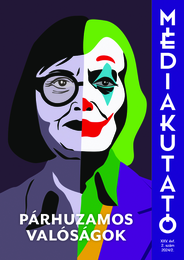Contents – Summer 2024
Kiss László:
Kiss László:
From media bias to parallel realities
Media bias is typically used in the literature in three senses: coverage bias, gatekeeping bias, and statement bias. The analysis of the corpus of articles reporting on teachers’ demonstrations and published on the news sites origo.hu and telex.hu suggests that media bias is a particularly salient problem in Hungary. In addition to offering highly different narratives on the events reported, the two news sites evince a high degree of news selectivity with highly different news frames. This paper argues that the two news sites representing different political stances create two completely separate “information universes,” with reports and interpretations depicting reality from completely different perspectives.
Keywords: media bias, online media, protest, teachers, text analysis
From media bias to parallel realities
Médiakutató Summer 2024 pp. 7-20 https://doi.org/10.55395/MK.2024.2.1
Farkas Xénia – Burai Krisztina – Bene Márton:
Farkas Xénia – Burai Krisztina – Bene Márton:
Riding the waves
How are the issue strategies of political leaders influenced by an external shock that changes agenda of the election campaign? The 2022 Hungarian parliamentary election campaign provides opportunity for this question to be investigated, as Russia attacked Ukraine only six weeks be Day. This study is to examine whether the campaign's issue strategies have changed under the this shocking event and, if so, what the main directions of the changes are. Hungarian party le Facebook posts issued during the campaign were submitted to manual content analysis covering both before and after the outbreak of the war. The findings suggest that while the war, the eco foreign policy play a greater role in the communication of most political actors after February 2 remarkable differences between political actors.
Keywords: campaign, external shock, Facebook, issue strategies, war
Médiakutató Summer 2024 pp. 23-37 https://doi.org/10.55395/MK.2024.2.2
Dér Dorottya Noémi – Huszár Sándor:
Dér Dorottya Noémi – Huszár Sándor:
Impact of social media visual contents on satisfaction with lifestyle among young women
Social media content may have a significant impact upon self-esteem, particularly among young women heavily exposed to increased use of social media and information communication technologies. Content appearing on various platforms may influence our attitudes and behaviours. However, the illusion of an “unattainable” body image may lead to self-esteem issues and dissatisfaction with oneself, which raises ethical questions regarding marketing communications. This study looks into the effects of fitspiration, body-positive, and neutral social media content upon young women’s satisfaction with various lifestyle factors. Ninety-three participants took part in a questionnaire survey combined with eye-tracking research exposing them to three different types of social media content in an attempt to assess its impact. The findings indicate that fitspiration-style content has a negative effect upon satisfaction with eating and exercise, but not upon health satisfaction. However, positive effects on lifestyle factors were not observed in the case of body-positive content.
Keywords: body positive, fitspiration, social media, young women
Impact of social media visual contents on satisfaction with lifestyle among young women
Médiakutató Summer 2024 pp. 41–50 https://doi.org/10.55395/MK.2024.2.3




